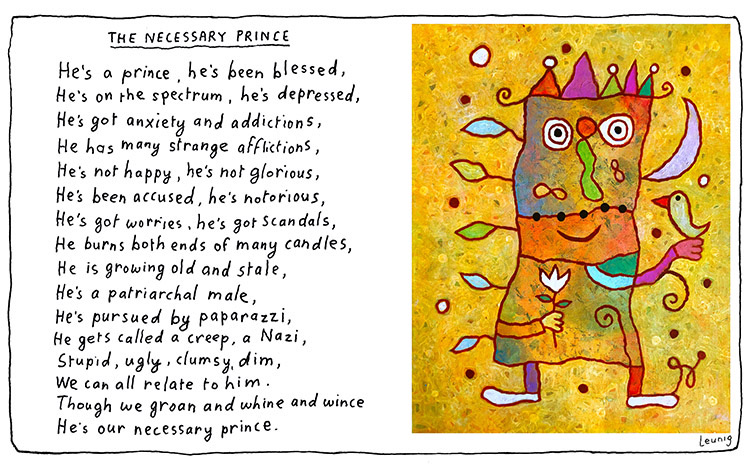Michael Leunig is one of 79 Australian National Living Treasures. There are certainly some august and worthy names on the list, like Barry Jones, Judy Davis, Julian Burnside, Evonne Goolagong Cawley, Garry McDonald, Mick Dodson, and Karl Kruszelnicki, there are also some relatively disreputable people, like Clive Palmer, Dawn Fraser, Germaine Greer, and Dick Smith. The Leunig of 2020 is far more likely to be sharing the stage with the latter, who’ve all let the privileges of age, wealth, politics and cultural capital blind them to the fact that the Australia they inhabit no longer needs them to help us understand what it means to be an Australian, or even what it means to be human.
Consistently vaunted for his philosopher-king’s outsider viewpoint and his “weaponised” whimsy, Leunig is also a deeply disingenuous and unreliable narrator who tells the patient and respectful documentarian Kasimir Burgess tales that could charitably be described as tall, but more accurately as deliberately opaque. Although Leunig has worked for Fairfax papers for most of his prolific career, in the company of some of the most important investigative journalists in Australia, he claims he doesn’t know where his parents are buried. While going through photographs of his family, he casually mentions that his father was probably partially indigenous. These mysteries that he lets slide out in casual conversation could have easily been resolved if that’s that Leunig wanted. The point, it seems, is that he doesn’t want them to be substantiated, probably because he doesn’t want to let go of his self-promotional myth of the enigmatic outsider.
The film was shot over a difficult five-year period during which Leunig not only suffered a series of seizures, but where he also retreated from Burgess and the process of filmmaking itself. Much of the footage shot by the extremely talented cinematographer Marden Dean, of Leunig standing by the waters of Circular Quay, is not of Leunig at all. Kasimir was forced quite literally to step into the shoes of his subject, donning a white wig just to complete principal photography.
Early in the film, Burgess meets Leunig in the famous North Fitzroy Tin Pot café to negotiate the terms on which the documentary will go ahead. Shot in an almost tabloid way, peeking through the window at two men conversing about the private in public, the camera becomes the mystified viewer. We hear only fragments of conversations. We are given only fragments of information. And in effect, this is the theme of the documentary. Leunig demands respect, privacy and the ability to create his own hagiography, all the while ensuring that the information he provides is vague and insubstantial.
Burgess intersperses other glimpses between these interviews with his reluctant subject; we see live interviews Leunig has given, such as his appearance on Andrew Denton’s Enough Rope, or Leunig showing his artistic process (at one point, live on stage whilst Katie Noonan sings), or the publishing Empire that is Leunig, as well as interviews with other prominent Australians including newspaper editors, politicians like Bob Brown, and cartoonists like Cathy Wilcox.
But most importantly, we see scripted recreations of Leunig’s childhood. These reminiscences, under Burgess’ hand, are most powerful and lovely aspects of this film. However, as much as they’re designed to give the audience a sense of how Leunig came to be, they’re also a dramatic fiction guided by Leunig himself. But growing up in post-war Australia in hardscrabble suburb, with busy parents trying to juggle multiple children, can’t have been very easy for his many contemporaries either.
Indulgent, yet beautifully shot and acted “sense memories” dominate the storytelling. Laying on the ground, looking at the light shine through a glass. The sound of soil being turned in the back yard by his father. Watching his mother care for siblings that aren’t him (the gall of the woman) and falling in love in primary school. These are just some of the supposedly idiosyncratic scenarios we are given.
The fictive character of these scenes should be unsurprising, given Leunig is an unreliable narrator. However, he’s also a multimillion-dollar industry. As he bemoans the death threats he receives, he still ensures that he’s one of the most recognisable faces in Melbourne, making a number of very public appearances after the film’s original MIFF release – including one in conversation, quite appropriately, with fellow cause célèbre Helen Garner.
As a business, Leunig has been trading on his outsider, neuro-atypical whimsy for many years. More recently, though, this has gone beyond his cartoons, which often act as metaphors for his own upbringing, and evolved into numerous and regular manifestations of misogyny, pseudoscience, and overwhelming self-pity for his own isolation.
Ultimately, the film is an elegy stage managed by Leunig, crafted by a filmmaker who will undoubtedly go on to better and worthier things. Burgess has done a remarkable job doing his best to film an immensely difficult subject with respect, and I look forward to his future work. Unfortunately, I cannot recommend The Leunig Fragments as it stands. Leunig is not our Necessary Prince, and our sympathies do not need to rest with a man whose work has become increasingly irrelevant and self-indulgent. The whimsical Leunig of yesterday has now become a self-aggrandising dreamer, who will perhaps have only his distant adoring public to light candles for him and pour tea in his honour, the ritual he follows every day for his parents. It may be that he simply won’t have anyone close who’s willing to do it for him in turn.
Director: Kasimir Burgess








